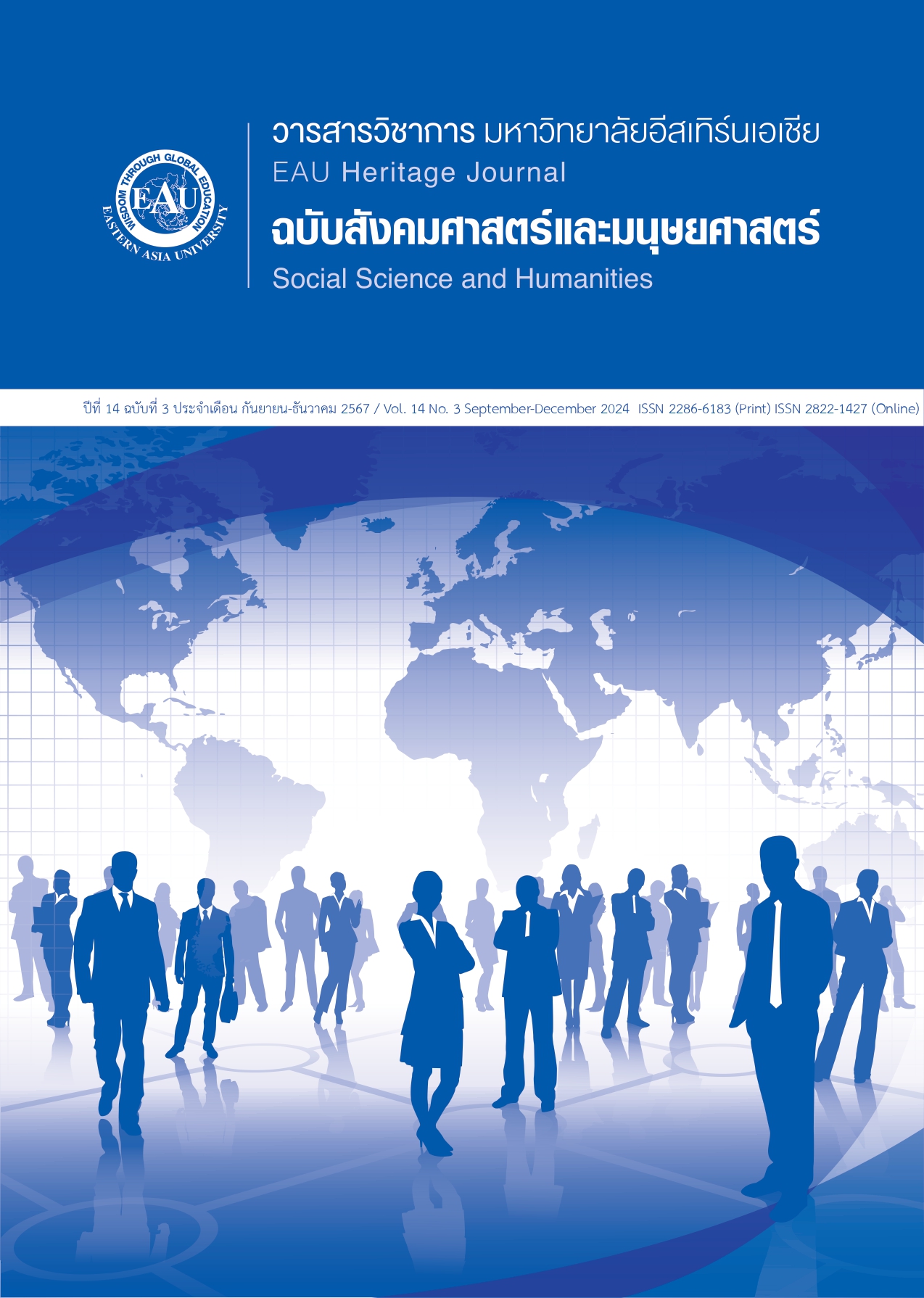The Development of Learning Package in 21st Century Skills to Students of Eastern Asia University
Keywords:
Curriculum and Instruction, learning skill training programs, 21st Century LearningAbstract
This research aimed to develop a comprehensive set of learning skill training programs tailored for university students in the 21st century, specifically targeting Eastern Asia University students. Additionally, it sought to evaluate the effectiveness and satisfaction levels of these programs among a sample group of 341 students from Eastern Asia University. Data analysis employed various statistical measures, including mean values, standard deviations, and t-tests. The development of the 21st century learning skill training programs yielded a structured framework consisting of four core components (1) details of the learning skill training program: This encompassed instructions, program components, participant prerequisites, activity characteristics, and the underlying structure of each activity (2) principles and rationale: This section included objectives, key content of the learning unit, learning management techniques, activity implementation steps, and activity assessment methods (3) learning resources and materials: These resources, such as lecture materials, knowledge sheets, and activity sheets, facilitated a dynamic and engaging learning experience (4) assessment tools: This included evaluation forms and student satisfaction questionnaires, designed to gather valuable feedback from participants. The findings from the satisfaction survey further affirmed the success of the 21st-century learning skill training program. Students at Eastern Asia University expressed a high level of satisfaction. This result underscores the effectiveness of the program in meeting the educational and skill development needs of the students, as well as their overall positive experience with the training initiatives.
References
Anderson, T., & Dron, J. (2010). Learning technology through three generations of technology enhanced distance education pedagogy. European journal of open, distance and
e-learning, 2012, 1-14.
Bastable. (2008). Nurse as educator. United States: Jones & Bartlett Learning.
Brockett, R. G., & Hiemstra, R. (1991). Self-direction in adult learning perspectives on theory, research and practice. London: Routledge. Doi: https://doi.org/10.4324/9780429457319
Chanruang, P. (2007). Principles and guidelines for curriculum development curriculum
and teach. Lopburi: Faculty of Education, Thepsatri Rajabhat University. (in Thai)
Chanruang, P. (2009). Development of an integrated teaching and learning model for
skills thinking and knowledge creation for students in the 2nd grade. Educational science, 21(1), 27–38. (in Thai)
Chathong, S. (2008). Study of creative writing skills of primary School Students Study Year 2 that was taught using a singular thinking training set. Khon Kaen University. (in Thai)
Henry, R., Hartley, B., Simpson, M., & Doyle, N. (2014). The development and evaluation of a holistic needs assessment and care planning learning package targeted at cancer nurses in the UK. Ecancermedicalscience, 8, 416. Doi: https://doi.org/10.3332/ecancer.2014.416
Manatt, R. P. (1971). An educator's guide to the new design. Dubuque, IA: Kendall/Hunt Pub.
Ministry of Education. (2008). Basic education core curriculum. Bangkok: Printing House of
the Agricultural Cooperatives Association of Thailand. (in Thai)
Ministry of Education. (2016). Basic education core curriculum. Bangkok: Printing House of
the Agricultural Cooperatives Association of Thailand. (in Thai)
Office of the National Education Commission. (1999). National education Act 1999.
Bangkok: Teachers' Council of Ladprao Printing House. (in Thai)
Panich, W. (2012). Quality education for the 21st century lecture documents in the schedule of the 6th academic conference of the association for professional development network for Teachers and organizations higher education commission of Thailand (Quat.) 2011. Bangkok: Higher Education Commission of Thailand. (in Thai)
Pareek, U., & Roa, T. V. (1980). Train of education manager: A draft handbook for trainer in
planning and management of education. UNESCO, Bangkok: Thailand. (in Thai)
Partnership Great Schools. (2014). 21st Century skills. Retrieved from
http://www.cde.state.co.us/postsecondary/21stcenturyskillsdefinitonspractice sandresearh. (in Thai)
Phanich, W. (2013). Creating learning for the 21st century. Bangkok: Siam Commercial
Bank Foundation Printing House. Srirat Chengklinchan. (in Thai)
Srisa-at, B. (2010). Preliminary research. (8th ed.). Bangkok: Suviriyasan. (in Thai)
Sengwong, P. (2007). Developing learning innovations using research methods in the
classroom. Bangkok: E.K. Books. (in Thai)
Sengwong, P. (2010). Developing learning innovations through classroom research.
Bangkok: E.K. Books. (in Thai)
Sueachan, U. (2010). Development of mathematical problem solving skills training on the
method of sorting shuffle and grouping methods mathematics learning group for Students secondary school Year 5. Naresuan University. (in Thai)
Thinong, P. (2010). Development of mathematics skill training on separating factors. of second degree polynomials for Mathayom 3 Students. Naresuan University. (in Thai)
Toiyee, B. S. (2011). Development of creative writing skills training for Students in primary School Mathayom 1, St. Teresa School, Nong Chok, Bangkok. Srinakharinwirot University. (in Thai)





